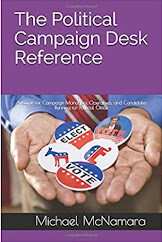Mastering the Elevator Pitch: Explaining Your Campaign in 30 Seconds

In politics, first impressions matter. Whether you’re meeting a voter, a donor, or the press, you need to explain your campaign quickly and persuasively. That’s where the “elevator pitch” comes in. What is an “Elevator Pitch?” The term “elevator pitch” gets its name from the concept that you should always be prepared to make your pitch for whatever is important to you because you never know when you will have a chance encounter on the elevator with someone who can change your life. An elevator pitch is a 30-second (or brief) summary of your campaign that answers: 1. Who you are 2. What office you’re running for 3. Why you’re running (your campaign message part 1) 4. What makes you different (your campaign message part 2) While running for political office, you will use your elevator speech when answering questions from the media, g...




